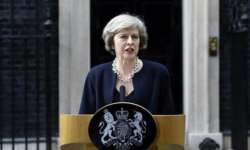Theresa May admits she can't pass Brexit deal without Labour
British Prime Minister Theresa May has admitted that the only way of passing her Brexit deal is with support from the opposition Labour Party, in comments that are likely to deepen the tensions on her own side of the political divide in the Britain.

British Prime Minister Theresa May has admitted that the only way of passing her Brexit deal is with support from the opposition Labour Party, in comments that are likely to deepen the tensions on her own side of the political divide in the Britain.
In a statement released on late Saturday, May said the deal she'd negotiated with the European Union (EU) had been rejected three times by Parliament and there was no chance of it passing in its current form. Given that Parliament has also made clear it will oppose a no-deal Brexit, the only way to secure a deal was through a compromise with Labour.
"If we cannot secure a majority among Conservative and DUP MPs we have no choice but to reach out across the House of Commons," she said, referring to the Democratic Unionist Party, the small bloc from Northern Ireland that props up her minority government in the House of Commons, CNN reported.
May's statement is an admission that her previous strategy of attempting to win over the hardline elements of her own party has failed. But her declaration that the only way forward is a deal with the opposition will further enrage the Brexiteer wing of the Conservative Party.
It is a high-risk move -- it will almost certainly result in a loss of support for the deal from her own side, without any guarantee that the process underway with Labour will lead to a successful outcome. May, however, has pledged to step down as Conservative Party leader, and no longer needs its support. In her statement, she said a cross-party approach was "in the national interest."
Talks with Labour began on Thursday evening, in an attempt to break the Brexit impasse. The Labour Party said late Friday that progress had been slow, because May had been reluctant to make firm commitments to change her Brexit deal. Labour wants the UK to remain in a customs union with the EU after Brexit, but is divided on whether to ask British voters to ratify any deal in a second referendum.
In her statement, May notably does not rule out a customs union or a second referendum, saying only that both main parties are committed to ending unrestricted immigration from the EU after Brexit.
"The fact is that on Brexit there are areas where the two main parties agree: We both want to end free movement, we both want to leave with a good deal, and we both want to protect jobs."
"That is the basis for a compromise that can win a majority in Parliament and winning that majority is the only way to deliver Brexit."
May is due to meet EU leaders at a special summit in Brussels on Wednesday, where she will ask for a short extension to the Brexit process, to June 30.
Unless the EU agrees to a delay, the UK will leave without a deal on April 12. Business leaders and economists have warned of chaos in the event of a no-deal Brexit.
May's strategy of reaching out to Labour has caused fury within her own party: Two ministers resigned from the government earlier this week, and party members posted pictures on social media tearing up their membership cards.